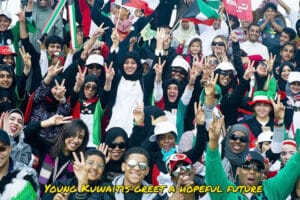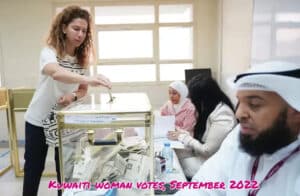by Neville Teller

Kuwait is an oil-rich emirate, tucked up in the north-western corner of the Persian Gulf. Its immediate neighbors are Saudi Arabia, Iraq and Iran. One factor that distinguishes it from other Gulf states is that Yasser Arafat founded Fatah there in 1959, and it became home to a large Palestinian diaspora. Before the US-led invasion of Iraq in 1991, some 400,000 Palestinians lived in Kuwait, amounting to 20 percent of its total population. Subsequent deportation and emigration has reduced that figure to 70,000 at the most.
Even so, a 2021 study by the Moshe Dayan Center for Middle Eastern and African studies concluded, largely because of its remaining Palestinian population, that “Kuwait does not seem ripe for decision on the highly sensitive issue of normalization.”
The Palestinian question has been a key issue in Kuwait for the past 60 years. But as 2022 dawned, different voices began to emerge within the country. On January 17 Kuwaiti writer and poet Nejoud Al-Yagout published a long article calling for Kuwait to join other Gulf states in fostering coexistence with Israel and the Jewish people. “There is no justified reason for the prejudice against Jews,” she wrote. “And there is no other time but now to wake up from this stupor of separation… Let’s take the wait out of Kuwait.”
She proceeded: “One can continue to support Palestine without hating Jews. Many Palestinians themselves coexist with Jews. And many Jews support Palestine. One can embrace Jews without having a political agenda… It is our responsibility, each one of us, to become ambassadors of humanity, beyond our belief systems, beyond our political inclinations.”
A few days later the Kuwait-based newspaper, the Arab Times, called openly for normalization and breaking away from the Palestinian leadership. “Normalize,” ran the headline. “Let insulters fend for themselves.”
In the accompanying editorial, Ahmed Al-Jarallah, editor-in-chief of the Arab Times, explained that Kuwait, along with the other Gulf States, had continued to support the Palestinian cause despite a long series of provocations by the Palestinian leadership. Among other matters he lists their support of Saddam Hussein’s invasion of Kuwait, of Colonel Gaddafi in his attacks on the Gulf states, and of the Iranian-bolstered Houthis. He objects to their condemnation of the leaders and governments of the Gulf Cooperation Council countries because they did not mourn the assassination of “the head of the terrorist snake Qassem Soleimani.”
“Enough is enough!” Al-Jarallah ended. “The camel’s back has been broken from the burden of grief we endure due to the ingratitude of the Palestinians. They have been encouraging terrorism against us, issuing calls to kill us…All the Gulf states should normalize relations with Israel due to the fact that peace with this most advanced country is the right thing to do. Let the foolish fend for themselves.”
Kuwait went to the polls on 29 September to elect a new parliament. The previous parliament, dissolved in June just six months after its 4-year term began, had become embroiled in months of political feuding with the government. Under the Kuwaiti system it is the Emir who both appoints the government and can dissolve the parliament.
However things are changing in Kuwait. Last year the Emir, Nawaf Al-Ahmad Al-Jaber Al-Sabah, issued an amnesty for political opponents who were on trial under various charges. Then, just before the poll, the country’s prime minister, Crown Prince Sheikh Meshal, the Emir’s son, speaking apparently on behalf of the Emir and the royal leadership, pledged not to meddle: “We will not interfere in the people’s choices for their representatives, nor will we interfere with the choices of the next National Assembly in choosing its speaker or its committees.” He added: “Parliament will be the master of its decisions and we will not be supporting one faction at the expense of another. We will stand at the same distance from everyone.”

This election was perhaps the most inclusive in Kuwait’s history. Although Kuwait was the first country in the Gulf region to establish an elected parliament in 1963, and women won the right to vote in 2005, there had been only one woman MP, Safa al-Hashem. In December 2020 she lost her seat. In this election 22 women were among the 305 candidates competing for the 50 elected seats in the National Assembly, and two women were elected.
These steps by Kuwait toward a more liberal system of government and more open society could also be seen as a move toward the pragmatic policies adopted by its fellow Gulf states, the United Arab Emirates (UAE) and Bahrain, on normalizing relations with Israel. Kuwait’s electorate, though, may be a few steps behind its leadership. The election resulted in considerable gains by Islamist parties, and the new parliament might seek to obstruct the government if it decided to pursue its liberalization policies.
What of the future? The Kuwaiti Emir has taken more than a leaf from the book of his Saudi neighbor, Crown Prince Mohammed bin Salman (MBS), whose ambitious Vision 2030 plan to transform the Saudi economy is well under way. Giving himself an extra five years to achieve his objectives, the Emir published his “Kuwait Vision 2035 – New Kuwait” in 2017, a year after MBS.
Kuwait’s 2035 vision aims to transform Kuwait into a regional and international financial and trade hub. With its economy led by the private sector, it will promote competition and production efficiency. A supporting institutional body will concentrate on cultivating a business friendly environment, especially attractive to investors. Without spelling it out, it seems obvious that the Emir’s vision would slot perfectly into a policy of normalization with Israel in line with that of the UAE and Bahrain. Kuwait will surely connect up the dots well before 2035.
